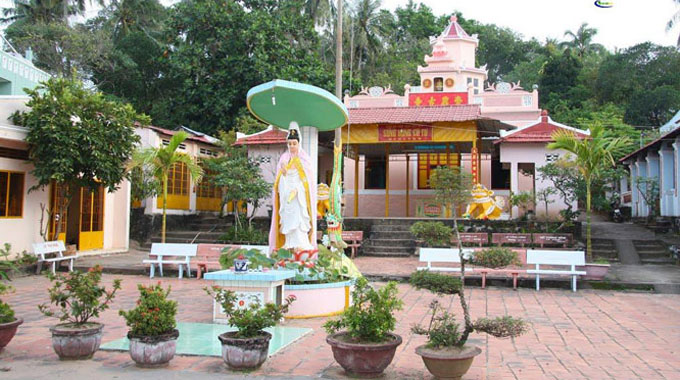Not only is it the oldest pagoda, Sung Hung Pagoda also has unique architecture and is one of the most popular spiritual tourist attractions in Phu Quoc. The pagoda welcomes a large number of tourists to visit and worship. It lies at the foothill of a mountain near the Duong Dong Town center.

The elders tell of two different pagodas named “Sung Nghia” and “Hung Nhan” before their time, which were later merged into one named “Sung Hung Pagoda” of today. Rumor also suggests the place was built in the early 20th century. The pagoda was refurbished twice in 1924 and 1960.
Sung Hung Pagoda has a very distinctive architectural structure which was unique for an ancient pagoda.
Situated on the mountain near the town center, the pagoda retains a harmonious architecture on an airy campus. It is surrounded by numerous lush ancient trees creating the solemn and quiet beauty.
Although one of the most famous Phu Quoc pagodas, it is not known when the pagoda established as well as background of the founders and the first abbot of the pagoda. It is just known that the 5th and 6th abbots were Monk Thich Dat Vinh and Monk Thich Minh Khiem who belonged to "Lam te Chanh tong" (Rinzai school).
In 1910, Monk Ming Khiem died, and the abbot's successor was Monk Thich Tinh Nghia. Then it was the abbot Monk Thich Hue Chanh in 1924.
Currently, due to his old age and poor health, Monk Hue Chanh decentralized control and care of the Buddhist in the pagoda to Monk Hue Thong, who is also under Rinzai School. The pagoda has undergone two major restorations in 1924 and 1960.
Outside the pagoda is three-gate entrance with wave-shaped tile roof and decorated by "2 dragons reaching the pearl" relief along with name-table of Sung Hung Pagoda in kanji and national language. Behind the imposing three-gate entrance is the statue of Avalokitesvara standing on the lake right at the pagoda's courtyard. Up ten sidesteps is a large courtyard with lotus pond and gate built with four wooden pillars and ying-yang tiled roof.
Both sides are flanked by two majestic unicorns which were offered from a generous donor nearly 100 years ago. This is relatively common architectural style in Phu Quoc pagodas.
Behind the gate is the sanctum which is constructed on masonry foundation nearly two meters high. Both sides of the sanctum are two house blocks with quicklime walls, which are places for tourists to stay. Inside the sanctum are numerous statues made from wood, bronze and plaster.
There is also a big bell and the system of horizontal lacquered boards, parallel sentences which are gorgeous red lacquer trimmed with gold. These unique architecture together with the ancient sacred atmosphere make Sung Hung Pagoda an impressive tourist site in Phu Quoc tourism.
The center shrine is arranged in three floors. The highest floor is home to worship Buddha with the statue of Amitabha sitting in the center, the statue of Mahasthamaprapta standing on the right, the statue of Avalokiteshvara standing on the left.
Behind the chancel is the altar decorated with a dragon masterpiece of the artist Cao Sanh. Scattered on the walls in the sanctum is a scene narrating the journey to the West of Tang Tang Master looking extremely vivid. Behind the sanctum are two paths including many sidesteps leading to the upper pagoda.
The pagoda attracts a large number of visitors in the area.
One can visit Sung Hung Pagoda easily, since it is near the center of Duong Dong Town. Entrance is free. It opens daily from 7am to 6pm. This should be a great chance for foreigners to learn more about ancient pagoda architecture as well as gain some knowledge of the most popular religion in Viet Nam.